高中英语辅导班辅导材料.docx
- 格式:docx
- 大小:58.88 KB
- 文档页数:16
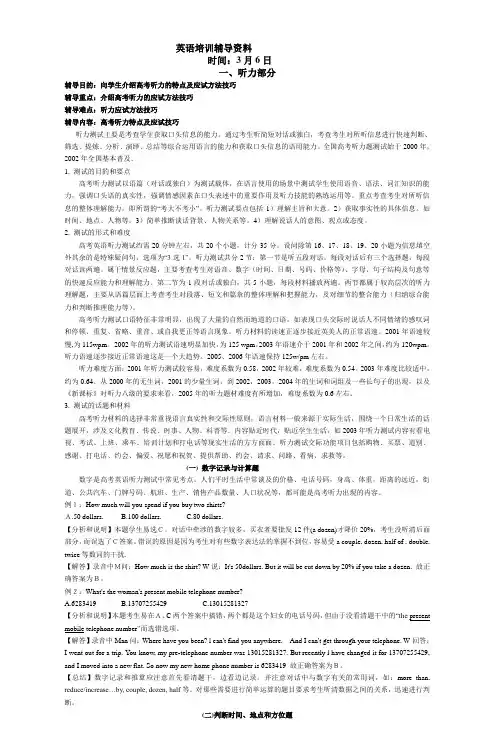
英语培训辅导资料时间:3月6日一、听力部分辅导目的:向学生介绍高考听力的特点及应试方法技巧辅导重点:介绍高考听力的应试方法技巧辅导难点:听力应试方法技巧辅导内容:高考听力特点及应试技巧听力测试主要是考查学生获取口头信息的能力。
通过考生听简短对话或独白,考查考生对所听信息进行快速判断、筛选、提炼、分析、演绎、总结等综合运用语言的能力和获取口头信息的语用能力。
全国高考听力题测试始于2000年,2002年全国基本普及。
1. 测试的目的和要点高考听力测试以语篇(对话或独白)为测试载体,在语言使用的场景中测试学生使用语音、语法、词汇知识的能力,强调口头语的真实性,强调情感因素在口头表述中的重要作用及听力技能的熟练运用等。
重点考查考生对所听信息的整体理解能力,即所谓的“考大不考小”。
听力测试要点包括1)理解主旨和大意。
2)获取事实性的具体信息。
如时间、地点、人物等。
3)简单推断谈话背景、人物关系等。
4)理解说话人的意图、观点或态度。
2. 测试的形式和难度高考英语听力测试约需20分钟左右,共20个小题,计分35分。
设问除第16、17、18、19、20小题为信息填空外其余的是特殊疑问句,选项为“3选1”。
听力测试共分2节:第一节是听五段对话,每段对话后有三个选择题,每段对话读两遍。
属于情景反应题,主要考查考生对语音、数字(时间、日期、号码、价格等)、字母、句子结构及句意等的快速反应能力和理解能力。
第二节为1段对话或独白,共5小题,每段材料播放两遍。
两节都属于较高层次的听力理解题,主要从语篇层面上考查考生对段落、短文和篇章的整体理解和把握能力,及对细节的整合能力(归纳综合能力和判断推理能力等)。
高考听力测试口语特征非常明显,出现了大量的自然而地道的口语。
如表现口头交际时说话人不同情绪的感叹词和停顿、重复、省略、重音、或自我更正等语言现象。
听力材料的读速正逐步接近英美人的正常语速。
2001年语速较慢,为115wpm。
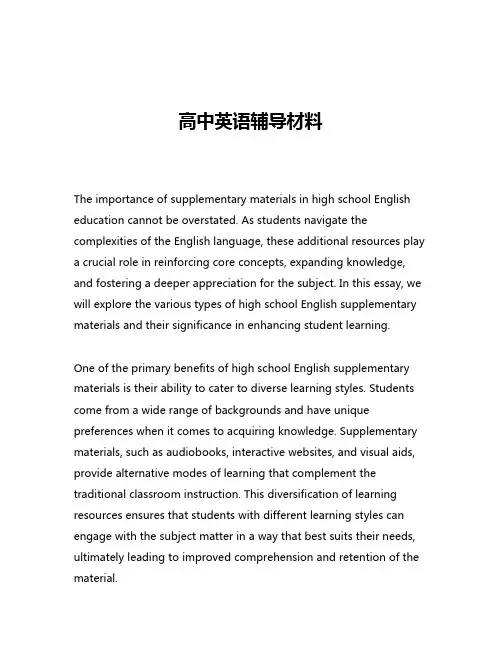
高中英语辅导材料The importance of supplementary materials in high school English education cannot be overstated. As students navigate the complexities of the English language, these additional resources play a crucial role in reinforcing core concepts, expanding knowledge, and fostering a deeper appreciation for the subject. In this essay, we will explore the various types of high school English supplementary materials and their significance in enhancing student learning.One of the primary benefits of high school English supplementary materials is their ability to cater to diverse learning styles. Students come from a wide range of backgrounds and have unique preferences when it comes to acquiring knowledge. Supplementary materials, such as audiobooks, interactive websites, and visual aids, provide alternative modes of learning that complement the traditional classroom instruction. This diversification of learning resources ensures that students with different learning styles can engage with the subject matter in a way that best suits their needs, ultimately leading to improved comprehension and retention of the material.Moreover, high school English supplementary materials often delve into more specialized or advanced topics that may not be fully covered in the standard curriculum. These materials can include literary analysis guides, in-depth explorations of specific genres or authors, and resources on advanced grammar and writing techniques. By providing access to these supplementary resources, students are empowered to explore their interests and deepen their understanding of the subject matter beyond the confines of the classroom. This enrichment not only enhances their academic performance but also fosters a genuine passion for the English language and literature.Another crucial aspect of high school English supplementary materials is their role in supporting struggling students. Many students may encounter difficulties with certain concepts or skills, such as reading comprehension, essay writing, or vocabulary development. Supplementary materials, such as targeted practice exercises, tutoring resources, and remedial lessons, can offer personalized support to these students, helping them overcome their challenges and achieve academic success. By addressing individual learning needs, these supplementary materials play a vital role in ensuring that no student is left behind and that all learners have the opportunity to thrive.Furthermore, high school English supplementary materials often serve as a bridge between the classroom and the real world. These materials can include career-oriented resources, such as guides on effective communication in the workplace, tips for crafting compelling resumes and cover letters, and insights into the role of English in various professions. By providing this practical application of English skills, supplementary materials help students understand the relevance of their studies and better prepare them for the demands of the post-graduation world.In addition to the academic and practical benefits, high school English supplementary materials can also contribute to the social and emotional development of students. Resources that explore themes of diversity, inclusivity, and social justice can foster empathy, critical thinking, and a deeper understanding of the human experience. These supplementary materials can encourage students to engage in meaningful discussions, challenge their own biases, and develop a more nuanced perspective on the world around them.It is important to note that the effectiveness of high school English supplementary materials largely depends on their quality, relevance, and alignment with the curriculum. Educators must carefully curate and evaluate these resources to ensure that they complement the core instruction and provide genuine value to the students. Ongoing professional development for teachers, as well as collaboration withsubject matter experts and educational technology providers, can help ensure that the supplementary materials used in high school English classrooms are of the highest caliber.In conclusion, high school English supplementary materials play a vital role in enhancing student learning, supporting diverse needs, fostering deeper engagement with the subject matter, and preparing students for the demands of the real world. By leveraging these supplementary resources, educators can create a rich and dynamic learning environment that empowers students to reach their full potential in the English language and beyond.。
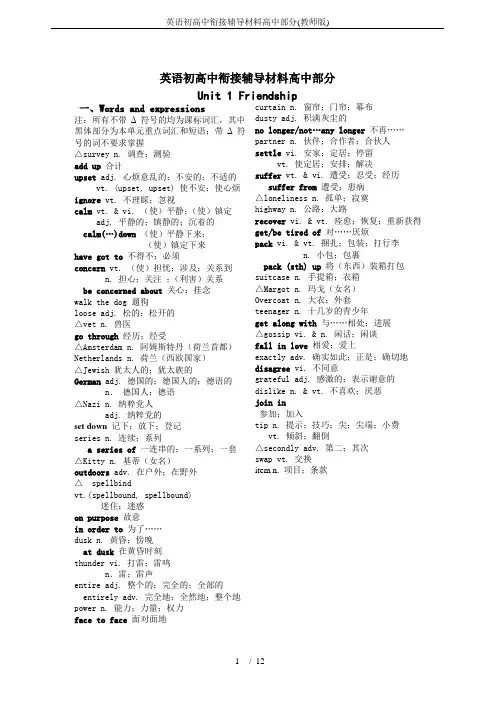
英语初高中衔接辅导材料高中部分(教师版)英语初高中衔接辅导材料高中部分Unit 1 Friendship一、Words and expressions注:所有不带Δ符号的均为课标词汇,其中黑体部分为本单元重点词汇和短语;带Δ符号的词不要求掌握△survey n. 调查;测验add up合计upset adj. 心烦意乱的;不安的;不适的 vt. (upset, upset) 使不安;使心烦ignore vt. 不理睬;忽视calm vt. & vi. (使)平静;(使)镇定adj. 平静的;镇静的;沉着的calm(…)down(使)平静下来;(使)镇定下来have got to不得不;必须concern vt. (使)担忧;涉及;关系到n. 担心;关注;(利害)关系be concerned about关心;挂念walk the dog 遛狗loose adj. 松的;松开的△vet n. 兽医go through经历;经受△Amsterdam n. 阿姆斯特丹(荷兰首都)Netherlands n. 荷兰(西欧国家)△Jewish 犹太人的;犹太族的German adj. 德国的;德国人的;德语的n.德国人;德语△Nazi n. 纳粹党人adj. 纳粹党的set down记下;放下;登记series n. 连续;系列a series of一连串的;一系列;一套△Kitty n. 基蒂(女名)outdoors adv. 在户外;在野外△spellbindvt.(spellbound, spellbound)迷住;迷惑on purpose故意in order to为了……dusk n. 黄昏;傍晚at dusk在黄昏时刻thunder vi. 打雷;雷鸣n.雷;雷声entire adj. 整个的;完全的;全部的entirely adv. 完全地;全然地;整个地power n. 能力;力量;权力face to face面对面地curtain n. 窗帘;门帘;幕布dusty adj. 积满灰尘的no longer/not…any longer不再……partner n. 伙伴;合作者;合伙人settle vi. 安家;定居;停留vt. 使定居;安排;解决suffer vt. & vi. 遭受;忍受;经历suffer from遭受;患病△loneliness n. 孤单;寂寞highway n. 公路;大路recover vi. & vt. 痊愈;恢复;重新获得get/be tired of对……厌烦pack vi. & vt. 捆扎;包装;打行李n. 小包;包裹pack (sth) up将(东西)装箱打包suitcase n. 手提箱;衣箱△Margot n. 玛戈(女名)Overcoat n. 大衣;外套teenager n. 十几岁的青少年get along with与……相处;进展△gossip vi. & n. 闲话;闲谈fall in love相爱;爱上exactly adv. 确实如此;正是;确切地disagree vi. 不同意grateful adj. 感激的;表示谢意的dislike n. & vt. 不喜欢;厌恶join in参加;加入tip n. 提示;技巧;尖;尖端;小费vt. 倾斜;翻倒△secondly adv. 第二;其次swap vt. 交换item n. 项目;条款课文原文正文ANNE’S BEST FRIENDDo you want a friend whom you could tell everything to, like your deepest feelings and thoughts? Or are you afraid that your friend would laugh at you, or would not understand what you are going through? Anne Frank wanted the first kind, so she made her diary her best friend.Anne lived in Amsterdam in the Netherlands during World War II. Her family was Jewish so they had to hide or they would be caught by the German Nazis. She and her family hid away fornearly Array twenty-fivemonths beforethey werediscovered.During that timethe only truefriend was herdiary. She said,“I don’t want toset down aseries of facts ina diary as mostpeople do, but Iwant this diaryitself to be myfriend, and Ishall call myfriend Kitty.”Now read howshe felt afterbeing in thehiding placesince July 1942. 副文Reading and listeningDear Miss Wang,I am having some trouble with my classmates at the moment. I’m getting along well with a boy in my class. We often do homework together and we enjoy helping each other. We have become really good friends. But other students have started gossiping. They say that this boy and I have fallen in love. This has made me angry. I don’t want to end the f riendship, but I hate others gossiping. What should I do?Yours,LisaLeading inRead the two materials below and get some information about friends and friendship 引入阅读AStudents are leaving the junior high school. What are they taking with them? A lot of things for sure, but the most important thing is friends.We asked some teachers to give us one last lesson. The lesson is proverbs(谚语、格言) about friends. Proverbs teach people about life. Older people often teach proverbs to younger people. Every culture has proverbs. They are short and easy to remember.Mrs Minelli says, “It is important to remember this Sicilian proverb, ' Only your real friends will tell you when your face is dirty. ' It means that only good friends tell you when you are making a mist ake. ”Mr Schmidt says, “I have a favourite proverb about friends. ‘ Friendship is a plant we must water.’ It is German. It means that we need to take care of friends like we take care of a garden.”Mr Tulga says, “My grandfather in Turkey told me ‘Nobody is so rich that he can throw away a friend.’ It means that everyone needs friends. Be good to them.”The good news is: there is no test for this lesson. The bad news is.- we will miss you. Goodbye, friends! Don't forget us!A 1. As the proverb says, _________will tell you when you are making mistakes.A. real friendsB. older peopleC. some teachersD. younger peopleB 2. Which is the best proverb to the meaning “Take care of friends like we take care of a garden”?A. A friend is easier lost than found.B. Friendship is a plant we must water.C. Nobody is so rich that he can throw away a friend.D. Only your real friends will tell you when your face is dirty.D 3. Which of the following is true from the passage?A. Only some countries have their proverbs about friends.B. After the last lesson, the students will have a test for it.C. If you are rich enough, you can throw away your friends.D. Proverbs are usually short, and they teach people about life.C 4. The writer of the passage mainly wants us to know_________.A. some proverbs about cultureB. ways to take care of a friendC. the importance of friendshipD. students' feelings in the last lesson引入阅读BFriendship is the relationship between persons who can help each other inneed and who have much in common.Friendship can make people happy andsuccessful.In my opinion,friendship is one of the most precious things we havefor several reasons.First,we can lead a happy life if we have some friends toshare feelings,for joy that is shared will be doubled and sorrow shared will bereduced.For instance,I felt a little lonely during my first days after I came tocollege because it was my first time to be away from my family and away frommy old friends.I often felt worried about my study and ter,I made friends with some of my fellow students.We talked about our ambitions,the way how to improveeach other well and became eager to help each other.And from then on,whenever I am in trouble,I always have someone to turn to.Now I don’t feel lonely any more but feel that life is really meaningful and enjoyable.Second,the company of friends can help us win success.It is well known that the friendship between Karl Marx and Engels largely contributed to their great success.Besides great figures, common people can also benefit a great deal from their friendship.For example,in the second year of my college,we were required to take the yearly test for English Majors (Band Four).It is a difficult national examination.While I was preparing for it,I felt very worried.But my friends and I helped and encouraged each other.As a result,we all passedMoreover,friendship has influence on our personalities.To win friendship we should have a pleasant manner.And to keep the friendship that we have obtained we ought to be 自律) and learn to be considerate(体谅).If everybody has friends and knows how to keep friendship,personalities of people will be improved and society will be in harmony(和谐).So we can say that friendship can do good not only to individuals but also to society,and aC 1.According to the writer,friendship is_______D 2.B 3.A.Pleasant manners.B.Self-disciplinedcomprehensionRead the text and decide whether the following statements are ture or false1.Anne lived in Amsterdam in the Netherlands during World War I.(F)2.Anne called her diary Betty. (F)3.Anne stayed awake on purpose until half past eleven in order to have a look at the moon by herself. (F)4.Anne kept a diary because she couldn’t meet her friends. (T)5.Anne’ family had to hide because Jews were caught by Nazis and killed. (T)Read the text again and choose the best answers for the followingB 6. Anne Frank and her family hid away for_____A. over a yearB. over two yearsC. three yearsD. one year and a halfC7. According to Anne, a true friend is a person _____.A. that would laugh at youB. who makes you happyC. whom you can trustD. who could save your lifeD8. Anne said that she had grown crazy about nature because _____A. her interest in natureB. she had always been so had grownC. she had been outdoorsD. she had been indoors too long.A9. She didn’t dare to open the window when the moon was bright .That’s because _____A. they might be discoveredB. her family might be disturbedC. it was very coldD. a thief might get into the roomC10. Anne and her family were caught by German Nazis _____A. about June 1945B. about February 1945C. about December 1944D. about November 19441.outdoors not inside a building2.upset feeling disturbed3.be concerned about to be worried about4. loose free, not tied up5. go through to experience something6. ignore___________ to take no notice of7. face to face staying close to and looking at somebody8. calm down to become quiet after nervous activity9. curtain _________ piece of material hung to cover a window10. series __________ number of things that happen one after anotherAnne’s sister, Margot was very upset that the family had to move. However, she knew that she had got to go through all the difficulties with her family. She found it difficult go settle and calm down in the hiding place, because she was concerned about whether they would be discovered. She suffered from loneliness, but she had to learn to like it there. What she really missed was going outdoors and walking the dog for her neighbour. It was such fun to watch it run loose in the park. She wished she could tell her neighbour face to face that she was sorry not to be able to do it any longer, but she knew that was too dangerous!1)When the man saw the car accident on the highway, he stopped in order to offer help.2)“How can Linda recover from her illness in this room when it’s so dirty and dusty? It will only make her worse,” said the doctor.3)After Peter died, George set down the story of their friendship in a book.4)When the street lights go on at dusk, they make a beautiful picture, so different from the daytime.5)Good friends do not add up what they do for each other; instead they offer help when it is needed.6)Although Tim and Mike come from entirely different backgrounds, they became close friends.7)Please draw down the curtain;the sunlight is too bright.8) “Sorry ,I didn’t break the plate on purpose.” “It’s don’t worry about it.”一、useful words and expressions1. add:add…to… 加;增加add … up 加起来add up to 加起来总和是;等于eg. Add your scores up and we’ll see who won.These numbers add up to 100.Will you please add some milk to my coffee?用适当的词或词语的适当形式填空1) Add _some milk and sugar to _coffee before drinking it.2) When we added up all the costs, we realized we had spent too much.3) His whole school education added up to no more than ten years.2. upsetadj.=unhappy; feeling uncomfortablevt.=make sb. unhappy用upset翻译下列两个句子①他的所作所为使他父母很不高兴。
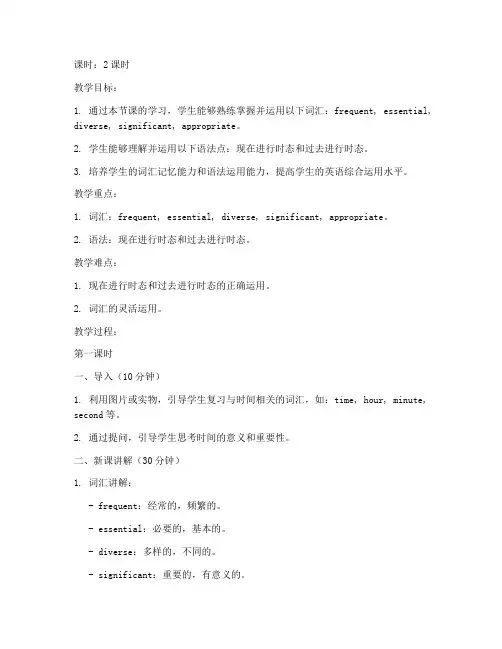
课时:2课时教学目标:1. 通过本节课的学习,学生能够熟练掌握并运用以下词汇:frequent, essential, diverse, significant, appropriate。
2. 学生能够理解并运用以下语法点:现在进行时态和过去进行时态。
3. 培养学生的词汇记忆能力和语法运用能力,提高学生的英语综合运用水平。
教学重点:1. 词汇:frequent, essential, diverse, significant, appropriate。
2. 语法:现在进行时态和过去进行时态。
教学难点:1. 现在进行时态和过去进行时态的正确运用。
2. 词汇的灵活运用。
教学过程:第一课时一、导入(10分钟)1. 利用图片或实物,引导学生复习与时间相关的词汇,如:time, hour, minute, second等。
2. 通过提问,引导学生思考时间的意义和重要性。
二、新课讲解(30分钟)1. 词汇讲解:- frequent:经常的,频繁的。
- essential:必要的,基本的。
- diverse:多样的,不同的。
- significant:重要的,有意义的。
- appropriate:合适的,适当的。
2. 语法讲解:- 现在进行时态:主语 + be动词(am/is/are)+ 现在分词 + 其他成分。
- 过去进行时态:主语 + was/were + 现在分词 + 其他成分。
三、练习(20分钟)1. 完成以下填空题,巩固词汇和语法知识:- It ______ (be) important to have a good time management.- I ______ (read) a book last night.- She ______ (do) her homework when I called her.- He ______ (watch) TV at that time.- They ______ (do) their exercises in the park.2. 判断正误,并改正错误:- 1. I am reading a book.- 2. He was eating an apple.- 3. They were playing football.- 4. She is cooking dinner.- 5. They are doing their homework.四、总结(5分钟)1. 总结本节课所学词汇和语法知识。
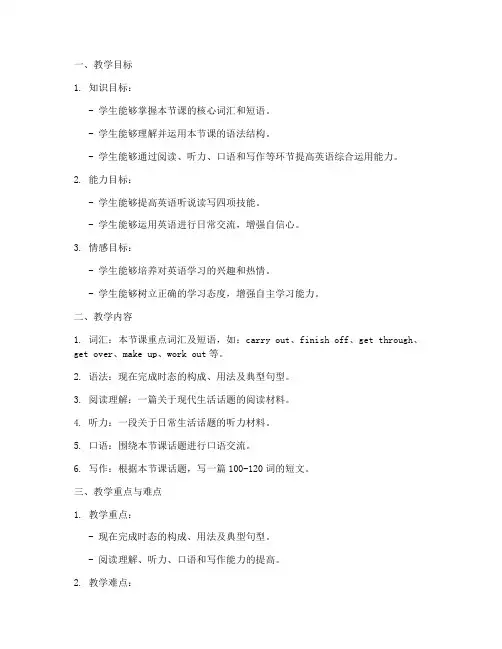
一、教学目标1. 知识目标:- 学生能够掌握本节课的核心词汇和短语。
- 学生能够理解并运用本节课的语法结构。
- 学生能够通过阅读、听力、口语和写作等环节提高英语综合运用能力。
2. 能力目标:- 学生能够提高英语听说读写四项技能。
- 学生能够运用英语进行日常交流,增强自信心。
3. 情感目标:- 学生能够培养对英语学习的兴趣和热情。
- 学生能够树立正确的学习态度,增强自主学习能力。
二、教学内容1. 词汇:本节课重点词汇及短语,如:carry out、finish off、get through、get over、make up、work out等。
2. 语法:现在完成时态的构成、用法及典型句型。
3. 阅读理解:一篇关于现代生活话题的阅读材料。
4. 听力:一段关于日常生活话题的听力材料。
5. 口语:围绕本节课话题进行口语交流。
6. 写作:根据本节课话题,写一篇100-120词的短文。
三、教学重点与难点1. 教学重点:- 现在完成时态的构成、用法及典型句型。
- 阅读理解、听力、口语和写作能力的提高。
2. 教学难点:- 现在完成时态的运用,特别是在不同语境中的灵活运用。
- 阅读理解中的信息提取和推理能力。
- 听力材料中的关键词汇和句型理解。
四、教学过程1. 导入(5分钟)- 复习上一节课所学内容,引入本节课主题。
- 提问:What have you done since last class?(自从上次课以来,你都做了些什么?)2. 词汇教学(10分钟)- 教师展示重点词汇和短语,讲解词义、用法及例句。
- 学生跟读、拼写、造句,巩固所学词汇。
3. 语法教学(15分钟)- 教师讲解现在完成时态的构成、用法及典型句型。
- 学生进行练习,巩固所学语法知识。
4. 阅读理解(20分钟)- 学生阅读阅读材料,回答相关问题。
- 教师点评、总结,引导学生理解文章主旨。
5. 听力训练(15分钟)- 学生听力材料,回答相关问题。
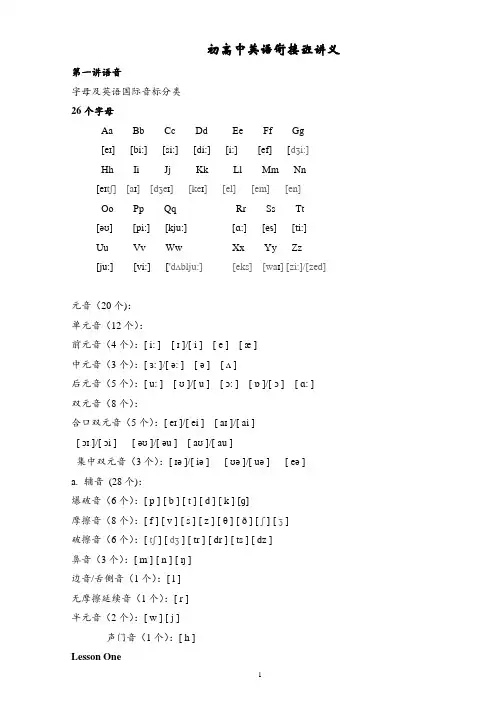
初高中英语衔接班讲义第一讲语音字母及英语国际音标分类26个字母Aa Bb Cc Dd Ee Ff Gg[eɪ] [bi:] [si:] [di:] [i:] [ef] [dʒi:]Hh Ii Jj Kk Ll Mm Nn[eɪtʃ] [aɪ] [dʒeɪ] [keɪ] [el] [em] [en]Oo Pp Qq Rr Ss Tt[əʊ] [pi:] [kju:] [ɑ:] [es] [ti:]Uu Vv Ww Xx Yy Zz[ju:] [vi:] ['dʌblju:] [eks] [waɪ] [zi:]/[zed]元音(20个):单元音(12个):前元音(4个):[ i: ][ɪ]/[ i ] [ e ][ æ ]中元音(3个):[ɜ: ]/[ ə: ] [ə][ʌ]后元音(5个):[ u: ][ʊ]/[ u ] [ɔ: ][ɒ]/[ ɔ ] [ɑ: ]双元音(8个):合口双元音(5个):[ eɪ]/[ ei ] [ aɪ]/[ ai ][ɔɪ]/[ ɔi ] [əʊ]/[ əu ] [ aʊ]/[ au ]集中双元音(3个):[ɪə]/[ iə ] [ʊə]/[ uə ] [ eə]a.辅音(28个):爆破音(6个):[ p ][ b ][ t ][ d ][ k ][ɡ]摩擦音(8个):[ f ][ v ][ s ][ z ][θ ][ ð][ʃ][ʒ]破擦音(6个):[tʃ][dʒ][ tr ][ dr ][ ts ][ dz ]鼻音(3个):[ m ][ n ][ŋ ]边音/舌侧音(1个):[ l ]无摩擦延续音(1个):[ r ]半元音(2个):[ w ][ j ]声门音(1个):[ h ]Lesson One[ p ][ b ][ t ][ d ][ i: ][ɪ]Step 1. Learn and read.[ p ]清音,双唇音,爆破音,送气,气流强。
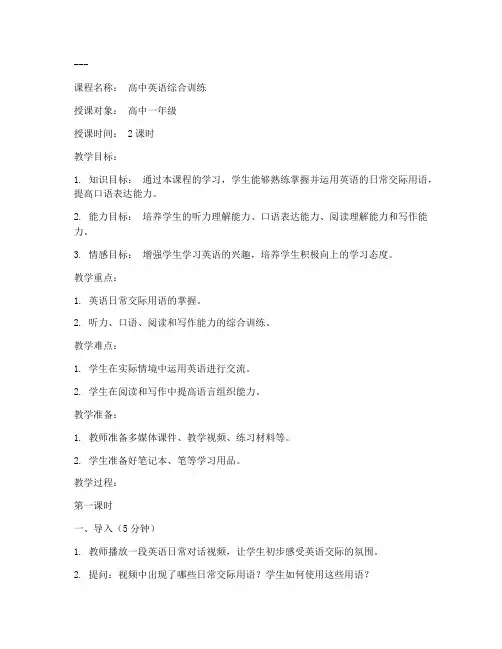
---课程名称:高中英语综合训练授课对象:高中一年级授课时间: 2课时教学目标:1. 知识目标:通过本课程的学习,学生能够熟练掌握并运用英语的日常交际用语,提高口语表达能力。
2. 能力目标:培养学生的听力理解能力、口语表达能力、阅读理解能力和写作能力。
3. 情感目标:增强学生学习英语的兴趣,培养学生积极向上的学习态度。
教学重点:1. 英语日常交际用语的掌握。
2. 听力、口语、阅读和写作能力的综合训练。
教学难点:1. 学生在实际情境中运用英语进行交流。
2. 学生在阅读和写作中提高语言组织能力。
教学准备:1. 教师准备多媒体课件、教学视频、练习材料等。
2. 学生准备好笔记本、笔等学习用品。
教学过程:第一课时一、导入(5分钟)1. 教师播放一段英语日常对话视频,让学生初步感受英语交际的氛围。
2. 提问:视频中出现了哪些日常交际用语?学生如何使用这些用语?二、新授(30分钟)1. 教师讲解英语日常交际用语的分类,如问候、道歉、感谢、邀请等。
2. 学生跟随教师练习常用的交际用语,如:- Greeting: Hello, how are you? / Good morning/afternoon/evening.- Apology: Sorry, I'm late. / Excuse me, could you help me?- Thank you: Thank you very much. / I appreciate your help.- Invitation: Would you like to join us for dinner? / Can we go to the movies together?3. 教师组织学生进行角色扮演,模拟实际情境,运用所学交际用语进行对话。
三、巩固练习(20分钟)1. 学生分组进行交际练习,教师巡回指导。
2. 教师挑选优秀小组进行展示,并对学生的表现给予评价和反馈。
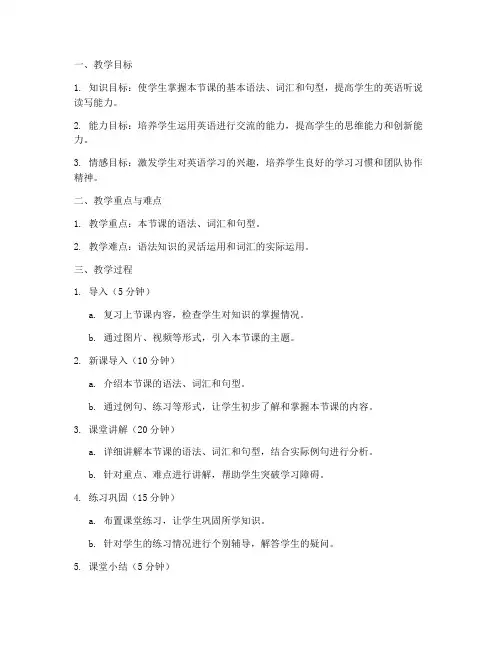
一、教学目标1. 知识目标:使学生掌握本节课的基本语法、词汇和句型,提高学生的英语听说读写能力。
2. 能力目标:培养学生运用英语进行交流的能力,提高学生的思维能力和创新能力。
3. 情感目标:激发学生对英语学习的兴趣,培养学生良好的学习习惯和团队协作精神。
二、教学重点与难点1. 教学重点:本节课的语法、词汇和句型。
2. 教学难点:语法知识的灵活运用和词汇的实际运用。
三、教学过程1. 导入(5分钟)a. 复习上节课内容,检查学生对知识的掌握情况。
b. 通过图片、视频等形式,引入本节课的主题。
2. 新课导入(10分钟)a. 介绍本节课的语法、词汇和句型。
b. 通过例句、练习等形式,让学生初步了解和掌握本节课的内容。
3. 课堂讲解(20分钟)a. 详细讲解本节课的语法、词汇和句型,结合实际例句进行分析。
b. 针对重点、难点进行讲解,帮助学生突破学习障碍。
4. 练习巩固(15分钟)a. 布置课堂练习,让学生巩固所学知识。
b. 针对学生的练习情况进行个别辅导,解答学生的疑问。
5. 课堂小结(5分钟)a. 回顾本节课所学内容,总结重点、难点。
b. 强调学习方法和技巧,提高学生的学习效果。
6. 课后作业(5分钟)a. 布置课后作业,巩固所学知识。
b. 强调作业的完成时间和质量要求。
四、教学评价1. 课堂表现:观察学生的参与度、课堂纪律等。
2. 作业完成情况:检查学生的作业质量,了解学生的学习效果。
3. 定期测试:通过测试了解学生对知识的掌握程度,为下一阶段的教学提供参考。
五、教学反思1. 教学过程中的亮点:总结教学过程中的成功之处,为今后的教学提供借鉴。
2. 教学过程中的不足:分析教学过程中的不足,为今后的教学改进提供依据。
3. 教学改进措施:针对教学过程中的不足,提出改进措施,提高教学效果。
六、教学资源1. 教材:人教版高中英语教材。
2. 课件:多媒体课件,包括图片、视频、音频等。
3. 练习题:课后练习题、测试题等。
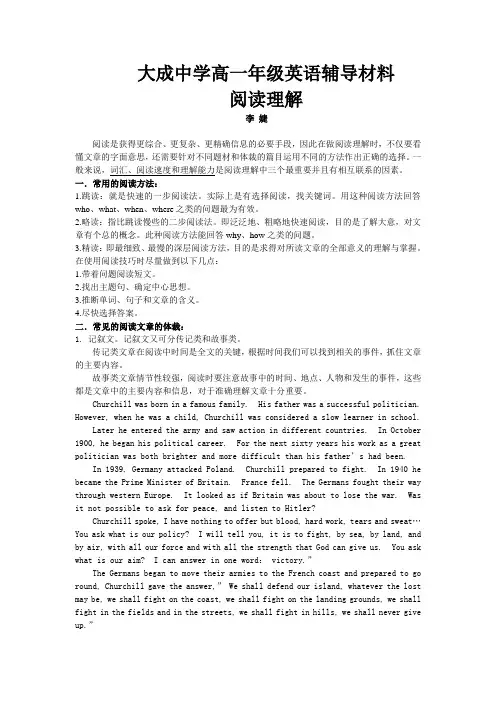
大成中学高一年级英语辅导材料阅读理解李婕阅读是获得更综合、更复杂、更精确信息的必要手段,因此在做阅读理解时,不仅要看懂文章的字面意思,还需要针对不同题材和体裁的篇目运用不同的方法作出正确的选择。
一般来说,词汇、阅读速度和理解能力是阅读理解中三个最重要并且有相互联系的因素。
一.常用的阅读方法:1.跳读:就是快速的一步阅读法。
实际上是有选择阅读,找关键词。
用这种阅读方法回答who、what、when、where之类的问题最为有效。
2.略读:指比跳读慢些的二步阅读法。
即泛泛地、粗略地快速阅读,目的是了解大意,对文章有个总的概念。
此种阅读方法能回答why、how之类的问题。
3.精读:即最细致、最慢的深层阅读方法,目的是求得对所读文章的全部意义的理解与掌握。
在使用阅读技巧时尽量做到以下几点:1.带着问题阅读短文。
2.找出主题句、确定中心思想。
3.推断单词、句子和文章的含义。
4.尽快选择答案。
二.常见的阅读文章的体裁:1. 记叙文。
记叙文又可分传记类和故事类。
传记类文章在阅读中时间是全文的关键,根据时间我们可以找到相关的事件,抓住文章的主要内容。
故事类文章情节性较强,阅读时要注意故事中的时间、地点、人物和发生的事件,这些都是文章中的主要内容和信息,对于准确理解文章十分重要。
Churchill was born in a famous family. His father was a successful politician. However, when he was a child, Churchill was considered a slow learner in school. Later he entered the army and saw action in different countries. In October 1900, he began his political career. For the next sixty years his work as a great politician was both brighter and more difficult than his father’s had been.In 1939, Germany attacked Poland. Churchill prepared to fight. In 1940 he became the Prime Minister of Britain. France fell. The Germans fought their way through western Europe. It looked as if Britain was about to lose the war. Was it not possible to ask for peace, and listen to Hitler?Churchill spoke, I have nothing to offer but blood, hard work, tears and sweat… You ask what is our policy? I will tell you, it is to fight, by sea, by land, and by air, with all our force and with all the strength that God can give us. You ask what is our aim? I can answer in one word:victory.”The Germans began to move their armies to the French coast and prepared to go round, Churchill gave the answer,” We shall defend our island, whatever the lost may be, we shall fight on the coast, we shall fight on the landing grounds, we shall fight in the fields and in the streets, we shall fight in hills, we shall never give up.”By this courage and hard work, he heartened his people and other nations fighting together against Hitler. Victory finally came when the Germans lost World War II. Churchill died in 1955 and was given a State Funeral. This was fitting payment to one of the greatest men the world had even seen.() 1. The Germans attacked Britain _________ .A. before Churchill became the Prime MinisterB. after France was defeatedC. soon after Poland was attackedD. before Churchill prepared to fight() 2. Which of the following is NOT true?A. Churchill worked as a politician for more than 60 years.B. People admired and respected Churchill very muchC. Churchill called on his people to fight against Hitler in all kinds of waysD. In the end Britain lost the war() 3. Why does the writer say Churchill’s work was “ both brighter and more difficult than his father’s”?A. Young Churchill was not so clever as his fatherB. Churchill’s father didn’t work for so many yearsC. Churchill led his nation through a warD. Churchill’s speeches were very encouraging() 4. Churchill was one of ________ in the British history.A. the most inspiring and bravest leadersB. the most clever and honest politicianC. the bravest but slowest politicianD. the most valuable and strongest leaders2. 说明文。

高三英语培优扶差材料以下是一份关于高三英语培优扶差的教学材料,供您参考:一、教学计划1. 教学目标:通过培优扶差,提高学生的英语成绩,为高考做好准备。
2. 教学内容:以高中英语教材为基础,结合历年高考真题,进行深入讲解和练习。
3. 教学时间:每周安排2次课程,每次课程2小时。
4. 教学手段:采用讲解、讨论、互动、游戏等多种教学方法,激发学生的学习兴趣和主动性。
二、教学材料1. 教材:《高中英语》(人教版)2. 练习册:《高中英语同步练习册》(人教版)3. 历年高考真题及答案解析4. 听力材料:BBC、VOA等英语广播听力材料5. 阅读材料:英文报纸、杂志、小说等6. 视频材料:英语电影、电视剧等7. 教学PPT:根据教学内容制作PPT,帮助学生更好地理解知识点。
三、教学步骤1. 讲解知识点:根据教材内容,深入讲解知识点,帮助学生理解并掌握重点难点。
2. 练习题讲解:针对练习册中的题目,进行详细的答案解析和解题技巧讲解。
3. 高考真题演练:组织学生练习历年高考真题,提高学生的应试能力和答题技巧。
4. 听力训练:通过听力材料,提高学生的英语听力水平。
5. 阅读训练:通过阅读材料,提高学生的阅读能力和阅读速度。
6. 视频教学:通过观看英语电影、电视剧等视频材料,提高学生的英语听说能力。
7. 互动讨论:组织学生进行互动讨论,鼓励学生用英语表达自己的观点和看法。
8. 小结与反馈:对学生的学习情况进行总结和反馈,帮助学生发现自己的不足之处并加以改进。
四、注意事项1. 根据学生的学习情况,进行个性化的辅导和指导。
2. 注意培养学生的自主学习能力和良好的学习习惯。
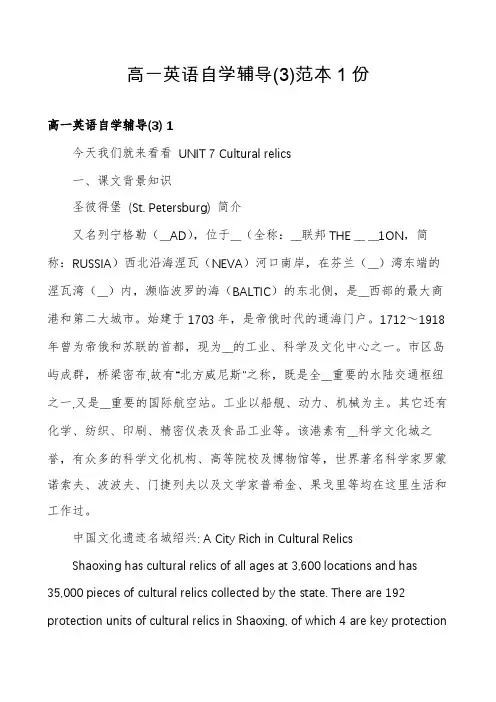
高一英语自学辅导(3)范本1份高一英语自学辅导(3) 1今天我们就来看看UNIT 7 Cultural relics一、课文背景知识圣彼得堡(St. Petersburg) 简介又名列宁格勒(__AD),位于__(全称:__联邦THE __ __1ON,简称:RUSSIA)西北沿海涅瓦(NEVA)河口南岸,在芬兰(__)湾东端的涅瓦湾(__)内,濒临波罗的海(BALTIC)的东北侧,是__西部的最大商港和第二大城市。
始建于1703年,是帝俄时代的通海门户。
1712~1918年曾为帝俄和苏联的首都,现为__的工业、科学及文化中心之一。
市区岛屿成群,桥梁密布,故有“北方威尼斯”之称,既是全__重要的水陆交通枢纽之一,又是__重要的国际航空站。
工业以船舰、动力、机械为主。
其它还有化学、纺织、印刷、精密仪表及食品工业等。
该港素有__科学文化城之誉,有众多的科学文化机构、高等院校及博物馆等,世界著名科学家罗蒙诺索夫、波波夫、门捷列夫以及文学家普希金、果戈里等均在这里生活和工作过。
中国文化遗迹名城绍兴: A City Rich in Cultural RelicsShaoxing has cultural relics of all ages at 3,600 locations and has 35,000 pieces of cultural relics collected by the state. There are 192 protection units of cultural relics in Shaoxing, of which 4 are key protectionunits at national level, 46 at provincial level. The Mausoleum of Yu the Great, the platform of king of the Yue state, the Orchid pavilion, the Shen Family Garden, the Green Vine Study, the former residence of Lu Xun, the ancestral residence of Zhou Enlai, the former residence of Cai Yuanpei are examples well known both at home and abroad. The profound accumulation in culture makes Shaoxing worthy of the name a museum without walls.二、课文疑难详解1 Work in pairs to prepare a “Chinese Culture Capsule”.分组制一个“中国文化盒”。
个性化辅导教案教学过程Teaching methods: Expository method; Question method and Practise methodProcedures:Step 1: Review what the student have learnt in the last class and check them ・Step 2: Lead-in:Present the student some pictures of other countries which are related to the culture and heritage: The Great Wall; Egyptian Pyramid; Stonehenge in England;Triumphal arch and so on.There are a lot of religious sites around the world that are of historic importance, Now ,discuss with your partner. Some useful expression: Where is it located?When and why it was set up? Who set it up?Step 3: learn the new words and phrasesStep 4:Fast reading: Answer the questions in Page 2.Careful reading: learn the language points in this passageStep 5: Homework.1. Finish the exercises in Page 4 and Page 52. Finish the paper of this Unit/J 、结 Learn the key and difficult language points and words as well as the grammar授课内容 分析、推导(突出教学内容要点,采用的教学方法 等,耍求简明扼要,若 有与教材中 相同的文 字.表格、例题等不要在教案上照 抄,可注明 教材页码。
英语初高中衔接辅导材料高中部分Unit 1 Friendship一、Words and expressions注:所有不带Δ符号的均为课标词汇,其中黑体部分为本单元重点词汇和短语;带Δ符号的词不要求掌握△survey n. 调查;测验add up合计upset adj. 心烦意乱的;不安的;不适的 vt. (upset, upset) 使不安;使心烦ignore vt. 不理睬;忽视calm vt. & vi. (使)平静;(使)镇定adj. 平静的;镇静的;沉着的calm(…)down(使)平静下来;(使)镇定下来have got to不得不;必须concern vt. (使)担忧;涉及;关系到n. 担心;关注;(利害)关系be concerned about关心;挂念walk the dog 遛狗loose adj. 松的;松开的△vet n. 兽医go through经历;经受△Amsterdam n. 阿姆斯特丹(荷兰首都)Netherlands n. 荷兰(西欧国家)△Jewish 犹太人的;犹太族的German adj. 德国的;德国人的;德语的n.德国人;德语△Nazi n. 纳粹党人adj. 纳粹党的set down记下;放下;登记series n. 连续;系列a series of一连串的;一系列;一套△Kitty n. 基蒂(女名)outdoors adv. 在户外;在野外△spellbindvt.(spellbound, spellbound)迷住;迷惑on purpose故意in order to为了……dusk n. 黄昏;傍晚at dusk在黄昏时刻thunder vi. 打雷;雷鸣n.雷;雷声entire adj. 整个的;完全的;全部的entirely adv. 完全地;全然地;整个地power n. 能力;力量;权力face to face面对面地curtain n. 窗帘;门帘;幕布dusty adj. 积满灰尘的no longer/not…any longer不再……partner n. 伙伴;合作者;合伙人settle vi. 安家;定居;停留vt. 使定居;安排;解决suffer vt. & vi. 遭受;忍受;经历suffer from遭受;患病△loneliness n. 孤单;寂寞highway n. 公路;大路recover vi. & vt. 痊愈;恢复;重新获得get/be tired of对……厌烦pack vi. & vt. 捆扎;包装;打行李n. 小包;包裹pack (sth) up将(东西)装箱打包suitcase n. 手提箱;衣箱△Margot n. 玛戈(女名)Overcoat n. 大衣;外套teenager n. 十几岁的青少年get along with与……相处;进展△gossip vi. & n. 闲话;闲谈fall in love相爱;爱上exactly adv. 确实如此;正是;确切地disagree vi. 不同意grateful adj. 感激的;表示谢意的dislike n. & vt. 不喜欢;厌恶join in参加;加入tip n. 提示;技巧;尖;尖端;小费vt. 倾斜;翻倒△secondly adv. 第二;其次swap vt. 交换item n. 项目;条款课文原文正文ANNE’S BEST FRIENDDo you want a friend whom you could tell everything to, like your deepest feelings and thoughts? Or are you afraid that your friend would laugh at you, or would not understand whatyou are going through? Anne Frank wanted the first kind, so she made her diary her best friend.Anne lived in Amsterdam in the Netherlands during World War II. Her family was Jewish sothey had to hide or they would be caught by the German Nazis. She and her family hid away fornearly Array twenty-fivemonths beforethey werediscovered.During that timethe only truefriend was herdiary. She said,“I don‟t want toset down aseries of facts ina diary as mostpeople do, but Iwant this diaryitself to be myfriend, and Ishall call myfriend Kitty.”Now read howshe felt afterbeing in thehiding placesince July 1942. 副文Reading and listeningDear Miss Wang,I am having some trouble with my classmates at the moment. I‟m getting along well with aboy in my class. We often do homework together and we enjoy helping each other. We havebecome really good friends. But other students have started gossiping. They say that this boy and I have fallen in love. This has made me angry. I don‟t want to end the f riendship, but I hate others gossiping. What should I do?Y ours,LisaLeading inRead the two materials below and get some information about friends and friendship 引入阅读AStudents are leaving the junior high school. What are they taking with them? A lot of things for sure, but the most important thing is friends.We asked some teachers to give us one last lesson. The lesson is proverbs(谚语、格言) about friends. Proverbs teach people about life. Older people often teach proverbs to younger people. Every culture has proverbs. They are short and easy to remember.Mrs Minelli says, “It is important to remember this Sicilian proverb, ' Only your real friends will tell you when your face is dirty. ' It means that only good friends tell you when you are making a mistake. ”Mr Schmidt says, “I have a favourite proverb about friends. … Friendship is a plant we must water.‟ It is German. It means that we need to take care of friends like we take care of a garden.”Mr Tulga says, “My grandfather in Turkey told me …Nobody is so rich that he can throw away a friend.‟ It means that everyone needs friends. Be good to them.”The good news is: there is no test for this lesson. The bad news is.- we will miss you. Goodbye, friends! Don't forget us!A 1. As the proverb says, _________will tell you when you are making mistakes.A. real friendsB. older peopleC. some teachersD. younger peopleB 2. Which is the best proverb to the meaning “Take care of friends like we take care of a garden”?A. A friend is easier lost than found.B. Friendship is a plant we must water.C. Nobody is so rich that he can throw away a friend.D. Only your real friends will tell you when your face is dirty.D 3. Which of the following is true from the passage?A. Only some countries have their proverbs about friends.B. After the last lesson, the students will have a test for it.C. If you are rich enough, you can throw away your friends.D. Proverbs are usually short, and they teach people about life.C 4. The writer of the passage mainly wants us to know_________.A. some proverbs about cultureB. ways to take care of a friendC. the importance of friendshipD. students' feelings in the last lesson引入阅读BFriendship is the relationship between persons who can help each other inneed and who have much in common.Friendship can make people happy andsuccessful.In my opinion,friendship is one of the most precious things we havefor several reasons.First,we can lead a happy life if we have some friends toshare feelings,for joy that is shared will be doubled and sorrow shared will bereduced.For instance,I felt a little lonely during my first days after I came tocollege because it was my first time to be away from my family and away frommy old friends.I often felt worried about my study and ter,I made friends with some of my fellow students.We talked about our ambitions,the way how to improveourselves and how to contribute to society.Through our heart to heart talks,wegot to know each other well and became eager to help each other.And from then on,whenever I am in trouble,I always have someone to turn to.Now I don‟t feel lonely any more but feel that life is really meaningful and enjoyable.Second,the company of friends can help us win success.It is well known that the friendship between Karl Marx and Engels largely contributed to their great success.Besides great figures, common people can also benefit a great deal from their friendship.For example,in the second year of my college,we were required to take the yearly test for English Majors (Band Four).It is a difficult national examination.While I was preparing for it,I felt very worried.But my friends and I helped and encouraged each other.As a result,we all passed the test with good scores.Moreover,friendship has influence on our personalities.To win friendship we should have a pleasant manner.And to keep the friendship that we have obtained we ought to be self disciplined(自律) and learn to be considerate(体谅).If everybody has friends and knows how to keep friendship,personalities of people will be improved and society will be in harmony(和谐).So we can say that friendship can do good not only to individuals but also to society,and a society that is full of friendship will be full of love and hope.C 1.According to the writer,friendship is_______.A.what makes people happyB.what people turn to when in troubleC.precious relationship between peopleD.what makes people successfulD 2.Which is the main idea of the first paragraph?A.Friends should help each other.B.College students should have friendship.C.Friends should share joy as well as sorrow.D.Friedship brings us happiness and success.B 3.Which of the following belongs to the personalities that keep up friendship?A.Pleasant manners.B.Self-disciplined.C.Smart.D.Talkative. comprehensionRead the text and decide whether the following statements are ture or false1.A nne lived in Amsterdam in the Netherlands during World War I.(F)2.A nne called her diary Betty. (F)3.A nne stayed awake on purpose until half past eleven in order to have a look at the moon by herself. (F)4.A nne kept a diary because she couldn‟t meet her friends. (T)5.A nne‟ family had to hide because Jews were caught by Nazis and killed. (T)Read the text again and choose the best answers for the followingB 6. Anne Frank and her family hid away for_____A. over a yearB. over two yearsC. three yearsD. one year and a halfC7. According to Anne, a true friend is a person _____.A. that would laugh at youB. who makes you happyC. whom you can trustD. who could save your lifeD8. Anne said that she had grown crazy about nature because _____A. her interest in natureB. she had always been so had grownC. she had been outdoorsD. she had been indoors too long.A9. She didn‟t dare to open the window when the moon was bright .That‟s because _____A. they might be discoveredB. her family might be disturbedC. it was very coldD. a thief might get into the roomC10. Anne and her family were caught by German Nazis _____A. about June 1945B. about February 1945C. about December 1944D. about November 19441.outdoors not inside a building2.upset feeling disturbed3.be concerned about to be worried about4. loose free, not tied up5. go through to experience something6. ignore___________ to take no notice of7. face to face staying close to and looking at somebody8. calm down to become quiet after nervous activity9. curtain _________ piece of material hung to cover a window10. series __________ number of things that happen one after anotherAnne‟s sister, Margot was very upset that the family had to move. However, she knew that she had got to go through all the difficulties with her family. She found it difficult go settle and calm down in the hiding place, because she was concerned about whether they would be discovered. She suffered from loneliness, but she had to learn to like it there. What she really missed was going outdoors and walking the dog for her neighbour. It was such fun to watch it run loose in the park. She wished she could tell her neighbour face to face that she was sorry not to be able to do it any longer, but she knew that was too dangerous!1)When the man saw the car accident on the highway, he stopped in order to offer help.2)“How can Linda recover from her illness in this room when it‟s so dirt y and dusty? It will only make her worse,” said the doctor.3)After Peter died, George set down the story of their friendship in a book.4)When the street lights go on at dusk, they make a beautiful picture, so different from the daytime.5)Good friends do not add up what they do for each other; instead they offer help when it is needed.6)Although Tim and Mike come from entirely different backgrounds, they became close friends.7)Please draw down the curtain;the sunlight is too bright.8) “Sorry ,I didn‟t break the plate on purpose.” “It‟s don‟t worry about it.”一、useful words and expressions1. add:add…to… 加;增加add … up 加起来add up to 加起来总和是;等于eg. Add your scores up and we‟ll see who won.These numbers add up to 100.Will you please add some milk to my coffee?用适当的词或词语的适当形式填空1) Add _some milk and sugar to _coffee before drinking it.2) When we added up all the costs, we realized we had spent too much.3) His whole school education added up to no more than ten years.2. upsetadj.=unhappy; feeling uncomfortablevt.=make sb. unhappy用upset翻译下列两个句子①他的所作所为使他父母很不高兴。
新高一暑期英语辅导材料『导言』首先祝贺同学们圆满地完成了初中阶段的学习任务并欢迎同学们进入秦淮中学高中阶段学习。
词汇量的大小是英语能力提高的根本词汇学习是英语学习的根本当我们从初中阶段的学习跨入高中阶段的学习,就英语这一门语言学科来说,同学们首先遇到的问题将是词汇量的扩大与翻番。
在我们掌握了英语的基本语音和一些语法知识后,英语能力的提高在很大程度上取决于词汇量的大小。
词汇是构成语言的三要素之一,它与语音、语法相比,变化较快。
随着社会和科学的发展,英语一方面增加了新词,一方面旧词有增添了新的意义。
同时,多义词的内涵越来越丰富。
因此,词汇学习成了英语学习的当务之急。
没有词汇就没有词组,没有词组就没有句子,没有句子我们就无法进行交际;没有句子也就没有文章,因而词汇的作用就好比高楼大厦的建起没有砖块不行。
所以说词汇是英语学习基础的基础.没有词汇,学英语就等于是一句空话。
一定的词汇量有助于我们对文章进行正确的分析与判断。
也可以说词汇量的大小是英语能力提高的根本;词汇学习是英语学习的根本。
综上所述大家都知道词汇在英语学习中占有如此重要的位置,同学们不妨利用这个暑假,回顾一下初中所学的词汇---词组、句型等。
这无疑对你即将进行的高中阶段的英语学习大有好处。
初中第一、二册所学的词汇---词组、句型等:一、短语、词汇与句型on duty look atlook like look afterIt doesn’t matter on footby bus/ train/ bike in the open airon Mid-Autumn Day help…with…next to in the front/ back rowat the front/ back go along…up and down in the same classput on take offcome in a bottle/ cup/ glass oftake… to put…awayget down something to drink/ eatWelcome back to school. a big/ small piece of paperlook after yourself less/ more thando eye exercises take a message ring upIt’s a pleasure.at the momentlast from…to go skatinga picture of my family a map of Chinathe girl in the hat g ive…toget on the bus a quarter to/ past twobe good at have a swimthis/next time I’ve no idea.on the left/ right in the middle ofa place called …the city ofkeep healthy go to the classroomgo to bed go homeIt’s your turn now.ride a bikemake a cake fly a kiteplay basketball near the rivera few a littlehow often three months agotake a walk later ongo on give…a messageHappy birthday! have a partygo for a walk turn greenget ready for be different fromBy the way…Which is the way to…?Go on until…on one’s way (to)…at the end of What’s the matter?be pleased Nice talking to you.be on a visit to too…toat last look overnot…any more turn on/ offat times take-away foodsomething different take enough exerciseinstead of No problem.pull…out of put…up fromall by ourselves no longerget dressed all by herself/ himselfleave one by oneself stop doingplace of great interest二、重要句型How do you like China? What’s wrong with…..?Would you like something to eat? I don’t think so.What about……?Don’t worry.What would you like? How many bottles of milk can you see? Do you want a go? There are some hills in the picture. May I borrow your ……?I’d like you to meet ……It’s time for ……How do you usually come to school?I usually come by bus. You’d better catch a bus.What day was it yesterday? What was the date yesterday?Could I speak to ……, please?Was there a message?It’d very cold today, isn’t it?Lucy is younger than Jim.She is the youngest of all. What does your father do?Where does he work? What a strong wind!How warm is it today! Would you like ……?Which do you like better, pork or beef? I like pork better than beef.Which do you like best? I like tomatoes best of all.Excuse me. Which is the way to ……, please?When the lights are green, the traffic can go.If you jump a queue, other people will not be pleased.It’s too dangerous to cross.I have to do some cooking.Can you hear anything? Help yourself to some cakes.We bought granny a pres ent, but she didn’t like it.I s there a car in the tree?What are you doing? I’m reading a book.Are you writing? Yes, I am../ No, I’m not. What day is it today? It’s Tuesday.Do you have an eraser? Yes, I do./ No, I don’t.初中英语第三册所学的词汇---词组、句型等::一、短语、词汇与句型be short of go on doing somethingprefer…to catch up withpay for do withon time in timeagree with be angry withplay with a moment laterhurry up hurry offWhat a pity! Help yourself!hear of go backlend to between …andget…from be in troubleNo hurry! send fortake a look be/ become interested inall one’s life see somebody doing somethingkeep…safe hold onbegin with in a minuteas soon as possible just thenleave a message come roundchange one’s mind do one’s besttwice a week learn … by oneselfbe ready to do something give somebody a callmake sure fill… withbe busy doing something dress uplook up on top ofat the end of cover… with… / be covered withask somebody not to do something make friends withtry on get on well withright away take one’s timemake a mistake be made of/ frombe made in in/ around/ all over the world be used for/ as/ by turn right/ lefton show No smoking!at the third crossing thanks toNo photos! More or lessstop… from far awayin a few years’ time neither…norso far send upwith one’s help knock intoat the beginning of wear outhour after hour a pair ofon the earth think aboutnever mind either… orsell out on and onin surprise fall overa bit by thencatch a cold ever sincecome along plenty ofbe/ feel afraid of help…withon the team at the foot ofby the end of play against二、重要句型as… as(not) so/ as … asWhat does … mean?You’d better (not) do something.… not … until…Will you please (not) do something?It’s another way of doing something.Have you ever been to West Hill Farm?I’ll return it as soon as I can.How long have you been at this school?I’ve been here for just over two years.My house is about twenty minutes by bike.He says that he won’t be free until tomorrow.Tell her to turn it down.Could you tell me how we get to the plane?I can’t decide which one to choose.What can I do for you?Please take you turn.What’s it made of?English is used as a foreign language in China.Can you tell me the way to the museum?It makes me feel thirsty.When was the Party founded?The more, the better.How many kilometers by train is it from Najing to Wuhan?What’s the population of Germany?In about 600 years, there will be standing room only on the earth.I’m looking for a pair of black shoes.Have you got any other color/ size/ kind?That’s cheap. I’ll have it, please.He became so angry that he couldn’t speak.There’s something wrong with Kate.You’d better not go to school.Do you want anything to eat?Take this medicine twice a day.Did you have a good journey?You are just in time for the football team.Which would like, a cup of tea or a glass of water.When shall we meet, this evening or tomorrow morning?I don’t mind. Either time is OK.三、短语动词短语动词在英语中是一种独特的词语。
高一英语辅导材料
对于高一学生来说,辅导材料的选择非常重要,因为这将影响他们的学习效果和未来的学习成绩。
以下是一些建议的高一英语辅导材料:
1. 课本:首先,确保学生已经有了与课程配套的英语课本。
这是最基本的学习材料,包含了所有需要掌握的语言点和知识点。
2. 练习册:为了巩固所学知识,一本好的练习册是必不可少的。
市面上有很多针对高一英语的练习册,例如《五年高考三年模拟》等,这些练习册包含了丰富的习题和解析,有助于学生深入理解和掌握知识。
3. 阅读材料:提高学生的阅读能力也是非常重要的。
可以选择一些适合高一学生水平的英文阅读材料,例如英文小说、新闻、文章等。
这将有助于学生提高阅读理解能力、词汇量和语法知识。
4. 听力材料:听力是英语学习中非常重要的一部分。
可以选择一些适合高一学生水平的英文听力材料,例如英语新闻、电影、电视剧等,这将有助于学生提高听力理解和语音识别能力。
5. 英语学习网站和应用程序:现在有很多线上英语学习平台和应用程序,例如扇贝、百词斩、BBC Learning English等,这些平台和应用程序提供了丰富的英语学习资源和互动学习体验,有助于学生随时随地学习英语。
总之,选择适合高一学生的英语辅导材料非常重要,要根据学生的学习情况和兴趣爱好来选择,以确保他们能够取得最好的学习效果。
课程名称:高中英语年级:高一年级班级:1班授课教师:张晓丽教学目标:1. 知识目标:掌握本节课的核心词汇和语法点,提高学生的英语阅读和写作能力。
2. 能力目标:培养学生运用英语进行交流的能力,提高学生的听力和口语表达能力。
3. 情感目标:激发学生学习英语的兴趣,增强学生的自信心,培养学生的团队协作精神。
教学重点:1. 词汇:掌握本节课的核心词汇,如:environment, pollution, protect, etc.2. 语法:学习现在进行时态的构成和用法。
教学难点:1. 词汇的准确记忆和应用。
2. 现在进行时态的灵活运用。
教学准备:1. 多媒体课件2. 教学辅助工具(如单词卡片、练习册等)3. 学生预习情况教学过程:一、导入(5分钟)1. 利用多媒体展示本节课的主题图片,引导学生思考:What is the environment like in our country?2. 引导学生进行自由讨论,分享自己对环境保护的看法。
二、新课导入(10分钟)1. 介绍本节课的核心词汇和语法点,如:environment, pollution, protect, be doing, etc.2. 通过例句展示现在进行时态的构成和用法。
三、课堂练习(20分钟)1. 词汇练习:让学生根据核心词汇造句,并互相纠错。
2. 语法练习:让学生进行现在进行时态的句子转换,如:一般现在时 -> 现在进行时。
四、小组活动(15分钟)1. 将学生分成若干小组,每组讨论一个与环境保护相关的话题,如:How to protect our environment?2. 各小组派代表进行口头汇报,其他小组进行评价。
五、课堂小结(5分钟)1. 回顾本节课所学内容,强调重点和难点。
2. 提醒学生课后复习,巩固所学知识。
六、布置作业(5分钟)1. 完成课后练习题,巩固本节课所学词汇和语法点。
2. 查阅资料,了解我国环境保护的现状,撰写一篇短文。
高中英语辅导材料辅导一:简单句的六种基本句式:句式 1:主语+谓语(不及物动词)特点:短小精悍,表意简练,需用不及物动词或相当于不及物动词的动词短语作谓语。
My father ________ in Beijing last year.去年我父亲在北京工作.The gas has _________________.煤气用完了。
注意:该句式的谓语多为不及物动词或相当于不及物动词的短语,因此没有被动语态,如下面的句子:Great changes have taken place in the past 30 years in China.不可说: Great changes have been taken place in the past 30 years in China.句式 2:主语+系动词+表语特点:句子简单,侧重说明主语是什么或怎么样;谓语动词需用系动词;表语多为形容词,也可为名词、介词短语、不定式及分词等。
系动词分类 :状态类:be 表像类: seem appear 感官类: feel look sound smell taste变化类:become come go get grow run turn fall持续类:remain continue stay keepAll these dictionaries _________ a great help to me.所有这些词典都对我帮助很大。
He always ________silent at the meeting.他开会是总是保持沉默。
This kind of cloth _________ very soft.这种布手感很软He __________ mad after that.自那之后,他疯了。
Her ideal has come ________.她的理想实现了。
注意 : 连系动词后面一般不接副词作表语,如:The apple tastes well.() 要说:× The apple tastes good.He looked sadly.() 要×说: He looked sad.句式 3:主语+谓语(及物动词 )+宾语特点:此句式的共同特点是谓语动词都是及物动词或相当于及物动词的短语,必须跟有一个宾语,即动作的承受者,才能使意思完整。
They will _______ __________________ next year.他们明年将种植三千棵树.Some of the students are always longing for ___________.有些学生总是渴望着放假。
注意:该句式的谓语动词要用及物动词。
如果是不及物动词,后面一定要跟介词构成及物词组,如:He is listening to music.他正在听音乐。
句式 4:主语+谓语(及物动词 )+间接宾语+直接宾语特点:谓语动词必须跟有两个宾语才能表达完整的意思。
这两个宾语一个是动作的直接承受者,另一个是动作的间接承受者。
Last month my mum bought ______ ______ _________.1我妈妈上个月给我买了台电脑That gentleman told us _____ ________ __________..那位绅士给我们讲了个有趣的故事。
句式 5:主语+谓语(及物动词 )+宾语+宾语补足语(n./adj./adv./-ing/v-pp/to do)特点:该句式中动词虽然是及物动词,但是只跟一个宾语还不能表达完整的意思,必须加上一个补充成分来说明宾语,才能使意思完整。
宾语补足语用来补充、说明宾语的情况。
I found him out.我发现他出去了。
They painted the door white.他们把门粉刷成白色。
He asked me to telephone him after 10 o’叫他clock我十.点后给他打电话。
When I came in, I found him ________a letter.我进来时,发现他正在写信。
句式 6: There be /lives/stands/happens/must be?句型我家房前有棵树。
There is a tree in front of my house.昨天发生了一件不愉快的事。
There _________ an unhappy thing yesterday.远处有座高楼。
There stands a high building in the distance.会议室里有一些客人在讲话. There are some people _________ in the meeting room.下周将举行运动会。
There will be a sports meet next week.灯还亮着,办公室里一定有人。
The light is on, so there ________ ______ someone in the office.辅导二:英语学习中常见的几种基本句型1.我感到有一点累。
I ______ a bit ________.2.我妹妹是在农村长大的。
My sister _______ ______in the countryside.3.他因为车子开得太快而违反了交通规则。
He ______ _______ _________ _________ because he drove fast.4.他总是把他的卧室收拾得干干净净。
He always keeps _______ ________ ________.5.去年这个地区雨水很少. _________ ________ a little rain in this area last year.句型 1:感叹句 (what/how+adj/adv+主语+谓语!)多好的消息啊!__________ ___________ __________ it is!________ ___________ the news is!多漂亮的衣服啊!__________ __________ _____________ ___________ it is!________ __________ the dress is!瞧!那辆车开得多快!Look! ________ __________ the car is running!句型 2:祈使句 + and/or/otherwise +简单句再试一下,你就会成功的。
_________ ___________ ___________ you’llsucceed.抓住这次机会,否则你会后悔的。
_________ the chance ,_______________you will regret.2保持安静,你就不会被人发现。
________ quiet ___________ you won’tbe found.努力找到好点的方法,你就会取得更大进步。
_________ to find a better way ___________ you will make greater progress.句型 3:简单句 +and/but/so/for/while +简单句他病了,但还是像往常一样去上学了。
He was ill, _______ he went to school as usual.汤姆很穷,而他的弟弟很富。
Tom was poor __________ his brother was rather rich.他丢了工作,因此心情不好。
He lost his job,_________ he was depressed.我们花了好久才到那儿,因为路程太远了。
It took us long to get there,_______ it was too far.句型 4:It 作形式主语的句型( 1 ) It is/was +adj./n.+to do/doing/that-clause帮助学生是老师的责任。
_______ _______ ____________ _________ ________help students.我们很难说服他戒烟。
______ _______ _____________ for us _________ persuade him to give up smoking.把这件事告诉他没用。
_______ _______ no use ___________ him about it.他竟然拒绝了邀请,真让人惊讶。
_______ ________ astonishing ________ he should refuse the invitation.同他谈那件事是浪费时间。
_______ ________ a waste of time ________ with him about it.我们有必要采取措施。
______ ________ necessary _________ we should take measures.______ ________ necessary ______ _________ ________ take measures.我们乘火车很方便。
_______ _________ convenient for us_______ take trains句型 5: it 作形式主语(2)Examples:It took him nine years master English.他花了九年时间掌握英语It appeared that he had a taste for music.看来他对音乐有一定的鉴赏力It is said that Li Hao has been to Europe.据说李郝去过欧洲.It remains unknown when they are going to get married.他们何时结婚依然不明使他改掉坏习惯将花两个月。
It ______ _________ _________ two months ________ get him out of the bad habit.你要完成这项工作需要很大耐心。
It _________ great patience _______ _______ ________ finish the job.据报道美国总统将访华。
______ _______ ________ _________ the US president would visit china.看来似乎要下雪了。